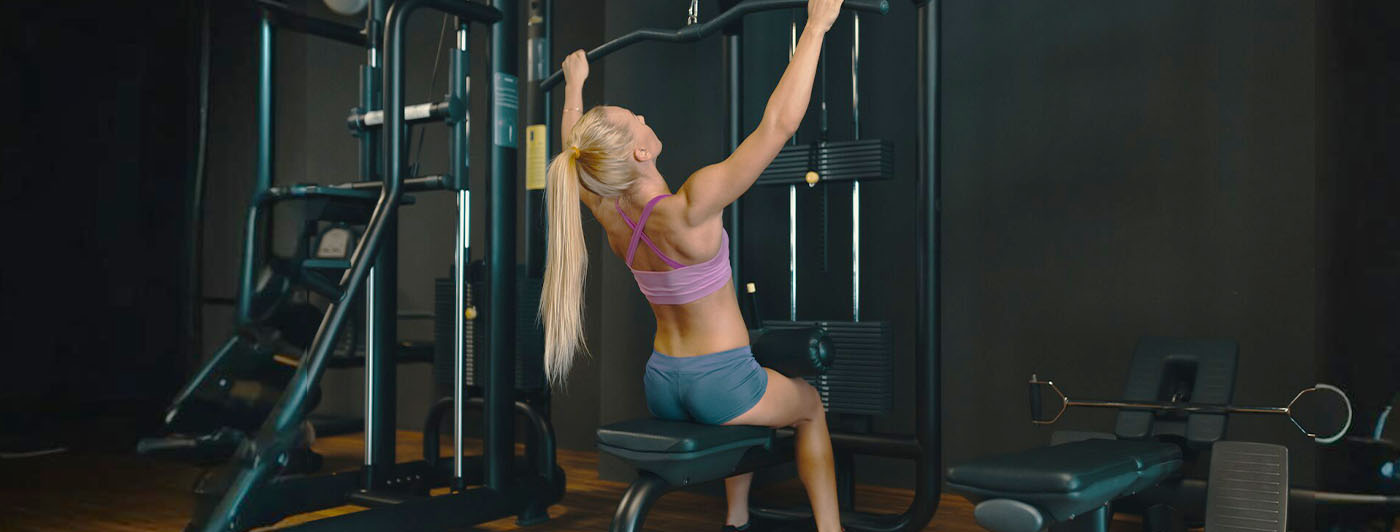When it comes to building a back that turns heads — wide, sculpted, and powerful — your typical dumbbell rows just won’t cut it. You need precision. You need constant tension. You need the game-changing power of cable back exercises.
These aren’t your average pull-and-pray movements. Cables hit your muscles from angles free weights can’t, giving you that deep burn, laser-sharp form, and serious hypertrophy potential.
Tired of cookie-cutter workouts and zero progress? These 10 cable exercises will flip the switch — unlocking real strength, better posture, and that V-taper physique everyone’s chasing.
Whether you’re just starting out or grinding at the advanced level, this list is your back-day upgrade. Let’s dive into the top 10 cable back exercises to build the kind of back you feel even when you’re not flexing.

1. Seated Cable Row
One of the most effective cable back exercises, the seated cable row targets your middle back, specifically the rhomboids, lats, and traps. Sit upright with your knees slightly bent and feet braced against the foot pad. Use a V-bar or wide-grip handle.
How to Perform:
-
Grab the handle and sit tall with a straight back.
-
Pull the handle towards your abdomen while squeezing your shoulder blades together.
-
Slowly extend your arms back to the start position without leaning forward.
Form Tip: Avoid jerking the weight or leaning back too far — keep the movement slow and controlled.
2. Lat Pulldown (Wide Grip)
A must-have in your back routine, the wide-grip lat pulldown is one of the most effective cable back exercises to build width by targeting your upper lats.
How to Perform:
-
Sit at the machine, grip the wide bar slightly wider than shoulder-width.
-
Pull the bar down to your upper chest while keeping your elbows wide.
-
Pause briefly at the bottom, then return the bar under control.
Post-workout recovery can be enhanced with a clean vegan protein powder, which helps rebuild muscle tissue without added hormones or allergens found in dairy-based options.
3. Straight Arm Pulldown
This isolation exercise zeroes in on the lats without involving the biceps too much, making it ideal for targeted muscle engagement.
How to Perform:
-
Stand upright and hold a straight bar attached to the high pulley.
-
Keep your arms straight and pull the bar downward in a sweeping arc to your thighs.
-
Pause and squeeze your lats, then slowly return.
For sustained energy during workouts, eat fiber rich foods like chia seeds or lentils that release energy slowly and aid digestion.
4. Single Arm Cable Row
Unilateral movements like this are excellent cable back exercises that help correct muscular imbalances and improve stability.
How to Perform:
-
Use a D-handle attachment on the low pulley.
-
Pull the handle toward your waist, focusing on squeezing your back.
-
Keep your torso stable — avoid twisting.
Nutrition Insight: Support nerve and muscle function by consuming vitamin B12 rich foods, such as fortified nutritional yeast or tempeh, especially important in plant-based diets.
5. Cable Face Pull
This dynamic movement strengthens the rear delts, rhomboids, and traps, improving posture and preventing shoulder injuries.
How to Perform:
-
Set the pulley at face level and attach a rope handle.
-
Pull the rope toward your face while flaring your elbows out.
-
Pause with the hands near your temples and slowly return.
A great pre or post-workout snack includes dry fruits for weight loss, like almonds and raisins, which provide quick energy without excess calories.
6. Standing Cable Row (Wide Grip)
Unlike seated rows, this variation is one of the more dynamic cable back exercises that forces your core to engage for balance and stability.
How to Perform:
-
Stand in front of the low pulley machine and grip the bar wide.
-
Pull the handle to your lower chest, squeezing the upper back.
-
Control the eccentric (lowering) part of the movement.
Even common meals like chapatis can help meet your goals. The protein in 1 roti is around 2–3 grams, which adds up across meals throughout the day.
7. Reverse Grip Lat Pulldown
A variation that shifts emphasis to the lower lats and biceps, this is one of the cable back exercises that enhances the depth of your back.
How to Perform:
-
Sit at the lat pulldown station and grip the bar with palms facing you (underhand grip).
-
Pull the bar to your chest, keeping elbows tucked in.
-
Control the return to the start position.
8. Cable Deadlifts
While often performed with barbells, doing deadlifts on cables is a safer, joint-friendly way to engage the entire posterior chain — glutes, hamstrings, and lower back.
How to Perform:
-
Attach a straight bar to the low pulley and stand over it.
-
Hinge at the hips, grip the bar, and lift while keeping a flat back.
-
Squeeze the glutes at the top before lowering with control.
Consider incorporating plant protein sources like mung beans, hemp, or flaxseeds into your daily diet for muscle repair and sustainability.
9. High Pulley Reverse Fly
An excellent cable back exercise for targeting the rear deltoids and upper traps, this move is essential for shoulder health and back symmetry.
How to Perform:
-
Set two single handles at the top pulley.
-
Stand in the middle, cross your arms to grab the opposite handle.
-
Pull both handles outward in a wide arc, squeezing shoulder blades together.
Searching for the best plant protein powder in India? Look for products without fillers, artificial flavors, or added sugar — clean formulations support better digestion and performance.
10. Cable Shrugs
Although simple, cable back exercises like shrugs build your trapezius muscles, which support neck posture and upper back strength.
How to Perform:
-
Attach a straight bar to the low pulley and stand upright.
-
Hold the bar and shrug your shoulders as high as possible.
-
Pause at the top and slowly lower.
Consistency in strength training combined with small dietary tweaks, like swapping processed snacks for whole options, creates lasting results.
Why Cable Back Exercises Work So Well
The beauty of cable back exercises lies in their adaptability and consistency in resistance. Unlike free weights where tension may vary during the lift, cables maintain it from start to finish, enhancing both strength and control. They also allow for a wide variety of angles and movements, hitting the muscles in ways traditional dumbbell or barbell exercises can’t.
Whether your goal is mass, strength, or posture improvement, the cable machine should be your go-to tool.
Final Thoughts
Incorporating these cable back exercises not only sculpts a strong back but also reduces injury risks and improves athletic performance. From pulling motions like lat pulldowns to isolating moves like reverse flies, every exercise brings something unique to your development journey.
To get the best results:
-
Stay consistent with your training.
-
Track your form meticulously.
-
Support your workouts with smart nutrition — blending whole foods, fiber rich foods, and plant-powered supplements.
Building a strong back is not just about lifting heavy; it’s about training smart. Let these cable back exercises be the backbone of your strength journey — literally and figuratively.












